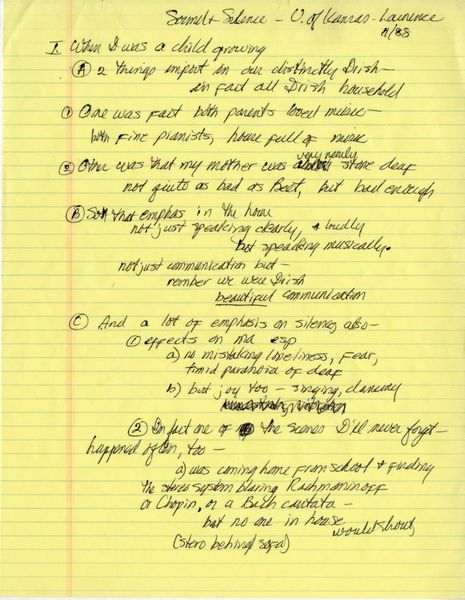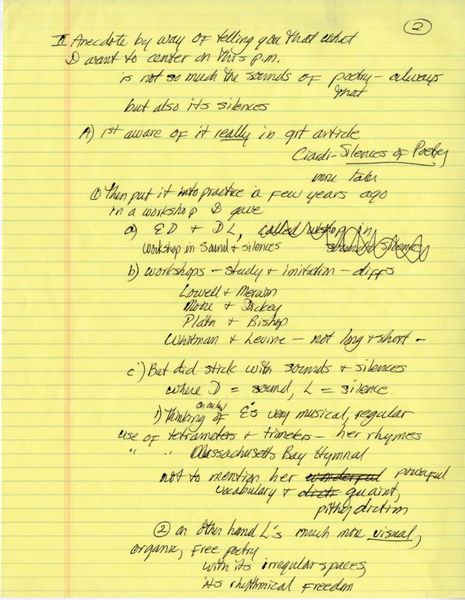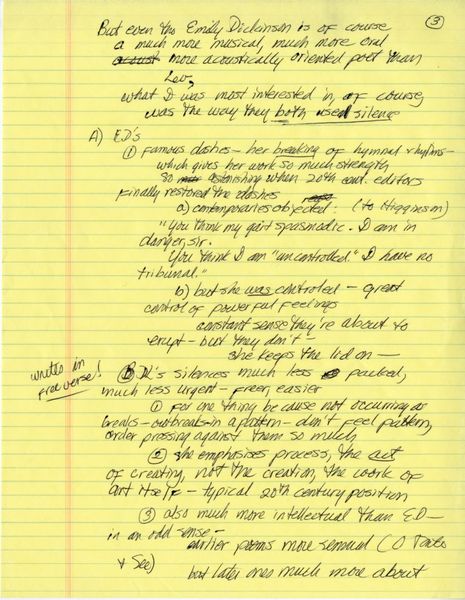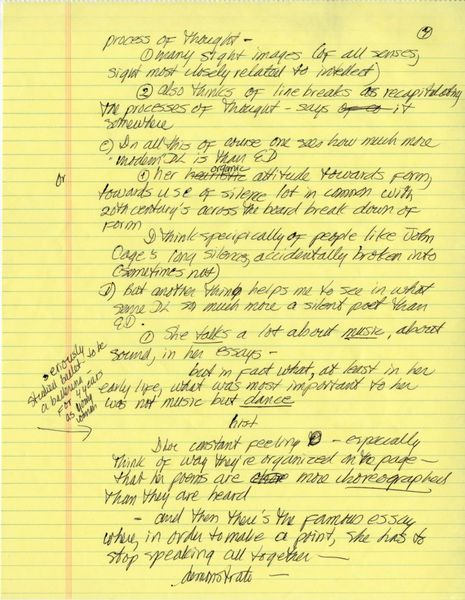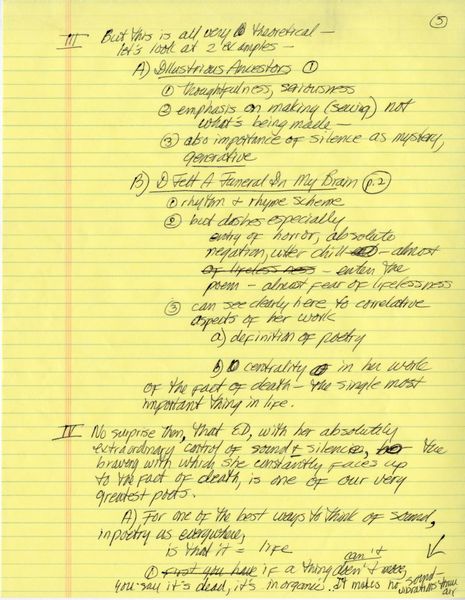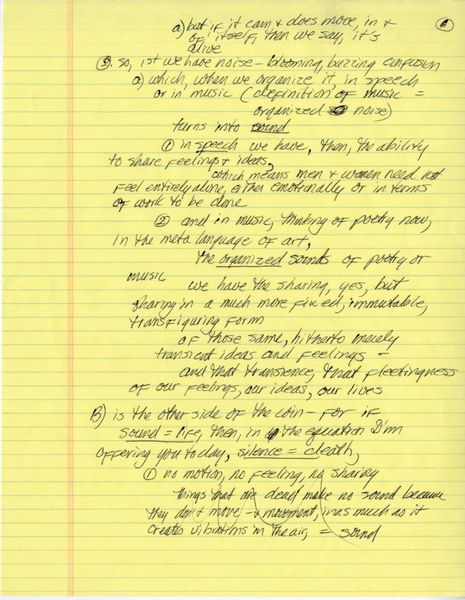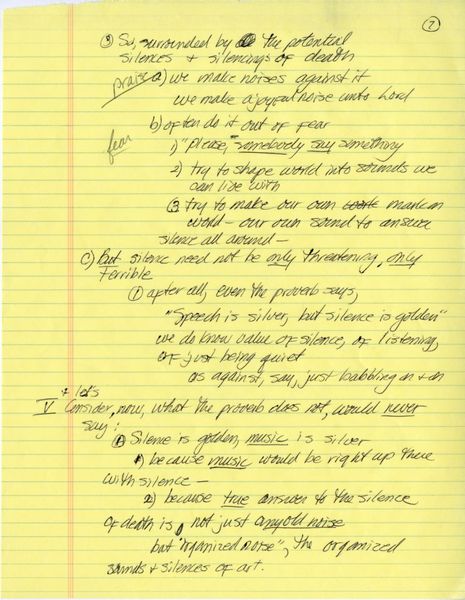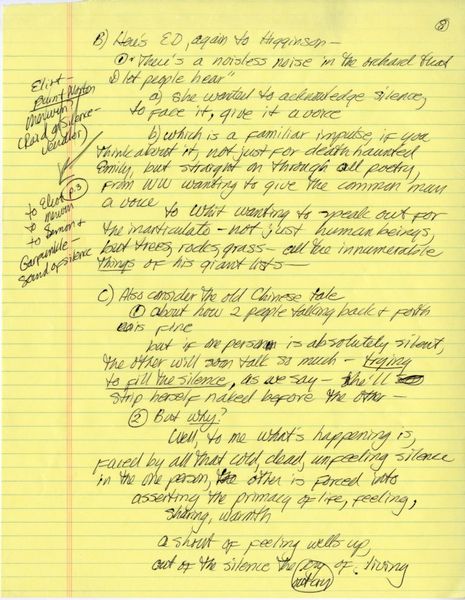Lecture on the Music of Poetry
In November 1988, Goedicke delivered a lecture at the University of Kansas on the subject of the use of sound and silence in poetry. She conceived of the topic when teaching an imitation workshop in 1982 that compared the works of Emily Dickinson and Denise Levertov. She observes that Dickinson's poetry emphasizes sound through the overwhelming musicality of her work, while Levertov's poetry emphasizes silence with its conversational tone and irregular spacing on the page. Goedicke observes that silence in poetry, which she describes in terms of the disruption of a poem's regular music, often introduces energy and passion into a work. By introducing silence into a poem, one invites a sense of death, which, paradoxically, is vital to a poem's meaning.
This section features only a handful of pages from her lecture notes. The first group of pages includes Goedicke's understanding of silence in relation to death. The second group of pages includes commentary on the use of silence in poetry. Included with the pages are notes to the abbreviations used by Goedicke and any other text that might not be immediately clear.
On silence and death
In section IV, Goedicke begins to directly associate sounds and silences with life and death.
With regards to sound, she argues that "organized sounds of poetry or music" provide a more "immutable, fixed, transfiguring form" to convey feelings and ideas that are inherently fleeting and transient.
Speaking of silence she states "So, surrounded by the potential silences + silencings of death...we make noises against it."
Abbreviations and References
"Illustrious Ancestors": a poem by Denise Levertov appearing in Overland to the Island (1958) and in Collected Earlier Poems (1979).
"I Felt a Funeral in My Brain" refers to the famed poem by Emily Dickinson (also refered to as poem 280).
ED stands for Emily Dickinson.
On the uses of sounds and silences in poetry
In this section, Goedicke argues that emotion within a poem emerges from silence. Goedicke also observes that both emotion and silence is lacking in contemporary poetry.
Starting with Section VI, Goedicke describes silence in terms of poetic devices and meter. By the end of the section, she cites Robert Hass and argues that "it's not the even-ness that matters, but the un-eveness...not the expected thing, but the postponement - even the denial of expectation - is what creates excitement.
Abbreviations and References
Emily Dickinson's (ED's) definition of poetry: One commonly referenced definitions by Emily Dickinson is "If I feel physically that the top of my head were taken off, then I know that is poetry." While one cannot be sure that this is the quote to which Goedicke referred, she did use this quote in an earlier version of this lecture given at the Midnight Sun Writers' Conference in 1983.
John Ciardi's essay "The Sound of Silence" and "The Western Wind" are presented as examples of poems where emotion emerges from silence.
The reference to "Vic's learning chess" is potentially a reference to Vic Contoski, professor of poetry at the University of Kansas at the time. Goedicke sat in on Contoski's workshop when she visited the University of Kansas in 1988.
Goedicke cites Robert Hass' essay "Listening and Making," which appears in a book titled Twentieth Century Pleasures, to discuss how rhythm and its disruption creates energy in free verse poetry.
